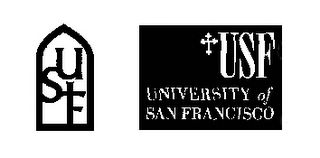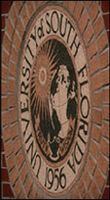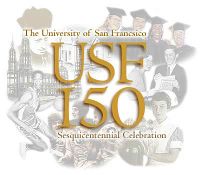University of South Florida Fails TTAB 2(d) Test
The University of South Florida didn't have a snowball's chance in Tampa when it appealed the PTO's decision in In re University of South Florida, Serial No. 78193899 (February 4, 2005) [not citable]. The TTAB wasted little time or paper (5 pages) in affirming the PTO's Section 2(d) refusal to register the mark USF for "educational services, namely, providing courses of instruction for others at the university level," finding it likely to cause confusion with the University of San Francisco's marks USF and USF SAN FRANCISCO, registered in the design forms shown below for identical services.

The Board observed that, given the legal identity of the services, the degree of similarity in the marks necessary to support a conclusion of likelihood of confusion is decreased. As to the marks, Judge Elmer W. Hanak, writing for the Board, pointed to what he found to be a "somewhat startling statement" in Florida's brief that conceded too much:
"The respective marks are acronyms and are identical in appearance, sound and connotation." (emphasis supplied by Judge Hanak)."Based on these two factors -- the "identical, virtually identical or extremely similar" marks and the identical services -- the Board readily concluded that there exists a likelihood of confusion under Section 2(d), and it affirmed the refusal to register.
Florida chose to devote its appellate energy to two hopeless arguments. First, it asserted that consumers "are highly discriminate as to their choice of school," but the Board observed again that when the marks in question are extremely similar or identical, even sophisticated consumers are likely to be confused.


Florida spent even more time asserting that confusion is unlikely because the schools are "dissimilar in terms of their geographic locations, total student enrollments and the like." The Board observed, as it so often does, that absent limitations in the recitation of services in the involved application and registration, the TTAB must decide the Section 2(d) issue in light of the services recited, rather than the services as actually rendered. See Canadian Imperial Bank v. Wells Fargo Bank, 1 USPQ2d 1813, 1815 (Fed. Cir. 1987).
Let's just hope that students intending to matriculate at the University of South Florida don't mistakenly wind up spending four years at the wrong school, and vice versa.
Text ©John L. Welch 2005. All Rights Reserved.




1 Comments:
USF is wasting its time on this lol
Post a Comment
<< Home